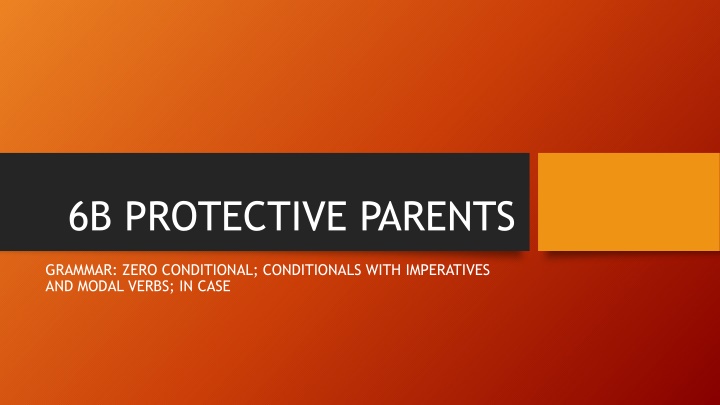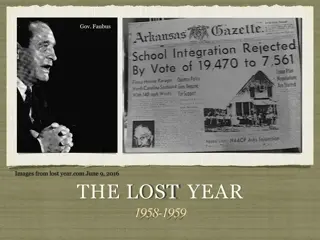
Grammar Tips: Zero Conditional, Imperatives, Modal Verbs
Learn about the zero conditional in grammar, using imperatives and modal verbs in conditionals, and explore examples of protective parents and their impact on children's freedom and activities. Enhance your understanding of grammar rules and sentence structures in English.
Download Presentation

Please find below an Image/Link to download the presentation.
The content on the website is provided AS IS for your information and personal use only. It may not be sold, licensed, or shared on other websites without obtaining consent from the author. If you encounter any issues during the download, it is possible that the publisher has removed the file from their server.
You are allowed to download the files provided on this website for personal or commercial use, subject to the condition that they are used lawfully. All files are the property of their respective owners.
The content on the website is provided AS IS for your information and personal use only. It may not be sold, licensed, or shared on other websites without obtaining consent from the author.
E N D
Presentation Transcript
6B PROTECTIVE PARENTS GRAMMAR: ZERO CONDITIONAL; CONDITIONALS WITH IMPERATIVES AND MODAL VERBS; IN CASE
PROTECTIVE PARENTS Please, open your books, p46. Read the article The Parent Trap . Please, try to do exercise 1. When you were a child, what did your parents make you do? What did they let you do? How do the children spend their free tim these days? How is this different to when you were a child?
Please, try to do exercise 3. Tick the true sentences and correct the false ones. Below, you can find help with new vocabulary: Protect keep safe from harm or injury The media the main means of mass communication (especially television, radio, newspapers, and the Internet) regarded collectively Grow up become adult Freedom - the power or right to act, speak, or think as one wants without hindrance or restraint
The Zero Conditional We can make a zero conditional sentence with two present simple verbs (one in the 'if clause' and one in the 'main clause'): If + present simple, .... present simple. This conditional is used when the result will always happen. If water reaches 100 degrees, it always boils. It's a fact. I'm talking in general, not about one particular situation. The result of the 'if clause' is always the main clause. The 'if' in this conditional can usually be replaced by 'when' without changing the meaning.
Here are some more examples: If people eat too much, they get fat. If you touch a fire, you get burned. People die if they don't eat. You get water if you mix hydrogen and oxygen. Snakes bite if they are scared. If babies are hungry, they cry.
You can use the imperative in the result-clause to give instructions, advice, or explain rules. If you want to lose weight, eat less and exercise more. If you drink, don t drive. Please don t disturb me if I am asleep! Eat something if you re hungry. Call me if you feel sad. If you don t like your job, quit! If you want to speak to someone, press 1.
You can use modal verbs. You use a modal before another verb in the zero conditional to express an idea such as ability, necessity, or permission. In the zero conditional sentence structure, you can use could, can, must, or should, and their negative forms. If you can t see the TV, you need glasses. If you can read this, thank a teacher! If you must know, I m not married. If you want to go to university, you must study hard. I can t drive if I don t have my glasses. If you drink, you shouldn t drive. If you have celiac disease, you can t eat wheat. It could happen to you if you re not careful! You should go to the doctor if you don t feel well.
in case if in case of can be used to shorten an if-clause as shown below: If there is a fire, leave the room. In case of fire, leave the room. While if expresses a condition (1), in case is used to express a possibility (2). I need painkillers if I'm in severe pain. I need painkillers in case I'm in severe pain. The expression just in case is used pretty much the same way. I got you a pizza just in case you are hungry. (I don't know whether you are hungry)
Thank you for your attention! # hope to see you soon Lecturer Ivana Mila i ivana.milacic@udg.edu.me










